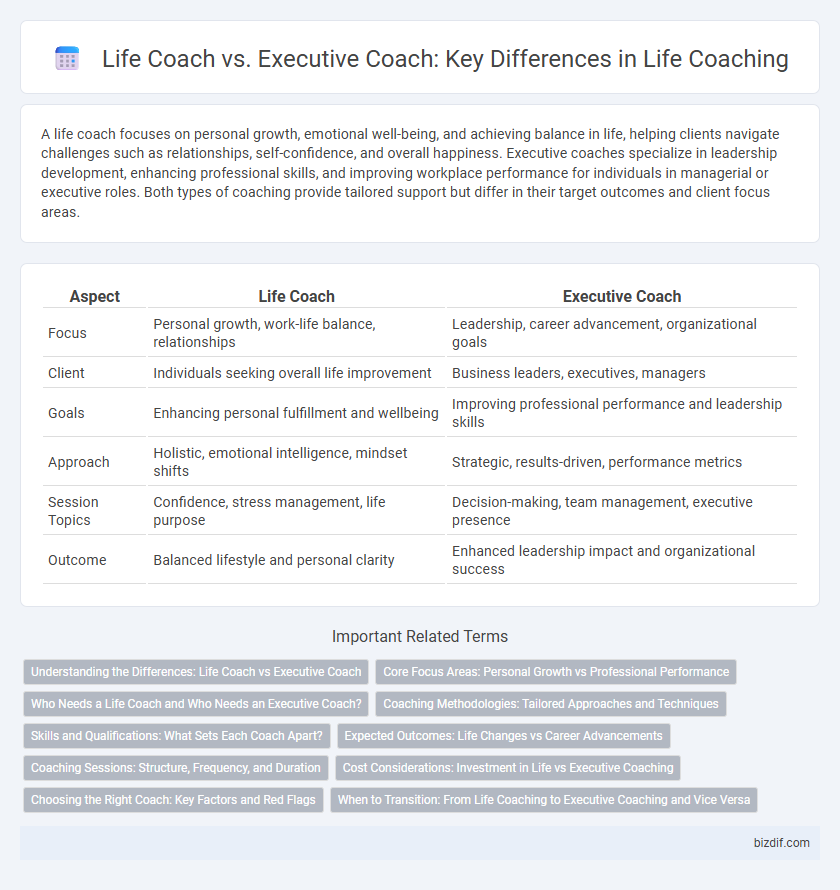A life coach focuses on personal growth, emotional well-being, and achieving balance in life, helping clients navigate challenges such as relationships, self-confidence, and overall happiness. Executive coaches specialize in leadership development, enhancing professional skills, and improving workplace performance for individuals in managerial or executive roles. Both types of coaching provide tailored support but differ in their target outcomes and client focus areas.
Table of Comparison
| Aspect | Life Coach | Executive Coach |
|---|---|---|
| Focus | Personal growth, work-life balance, relationships | Leadership, career advancement, organizational goals |
| Client | Individuals seeking overall life improvement | Business leaders, executives, managers |
| Goals | Enhancing personal fulfillment and wellbeing | Improving professional performance and leadership skills |
| Approach | Holistic, emotional intelligence, mindset shifts | Strategic, results-driven, performance metrics |
| Session Topics | Confidence, stress management, life purpose | Decision-making, team management, executive presence |
| Outcome | Balanced lifestyle and personal clarity | Enhanced leadership impact and organizational success |
Understanding the Differences: Life Coach vs Executive Coach
Life coaches specialize in personal development, helping clients achieve balance, set life goals, and improve overall well-being, while executive coaches focus on enhancing leadership skills, strategic thinking, and performance within professional environments. Understanding the differences involves recognizing that life coaching addresses broader life challenges and personal growth, whereas executive coaching targets organizational success and career advancement. Tailoring coaching methods to individual client needs ensures effective outcomes in both personal life and executive functions.
Core Focus Areas: Personal Growth vs Professional Performance
Life coaching centers on personal growth by helping clients enhance self-awareness, set meaningful life goals, and overcome limiting beliefs to achieve overall well-being. Executive coaching targets professional performance, improving leadership skills, strategic decision-making, and organizational effectiveness for business success. Both coaching types leverage tailored techniques but differ primarily in their core focus areas--individual fulfillment versus workplace excellence.
Who Needs a Life Coach and Who Needs an Executive Coach?
Individuals seeking personal growth, improved self-awareness, and work-life balance typically benefit from a life coach, who addresses areas such as confidence, relationships, and goal setting. Executive coaches primarily support leaders, managers, and professionals aiming to enhance leadership skills, strategic thinking, and organizational performance. Choosing between a life coach and an executive coach depends on whether the focus is personal development or professional leadership advancement.
Coaching Methodologies: Tailored Approaches and Techniques
Life coaching methodologies emphasize personalized goal-setting, mindset shifts, and holistic well-being techniques to foster personal growth and life balance. Executive coaching prioritizes leadership development, strategic decision-making, and performance optimization using assessments, feedback tools, and targeted skill-building exercises. Both approaches leverage active listening and powerful questioning but adapt frameworks specifically for individual life challenges or corporate leadership demands.
Skills and Qualifications: What Sets Each Coach Apart?
Life coaches typically emphasize skills in personal development, emotional intelligence, and goal setting, often holding certifications from organizations like the International Coach Federation (ICF). Executive coaches, however, bring advanced expertise in leadership development, organizational behavior, and business strategy, frequently backed by executive training or MBA qualifications. This distinction in skills and qualifications enables life coaches to focus on individual growth, while executive coaches target professional performance and leadership effectiveness.
Expected Outcomes: Life Changes vs Career Advancements
Life coaching primarily targets holistic personal growth, fostering emotional resilience, improved relationships, and enhanced life satisfaction. Executive coaching concentrates on career advancements by developing leadership skills, strategic decision-making, and organizational performance. Clients seeking life transformation focus on self-awareness and work-life balance, whereas those pursuing executive coaching aim for professional success and goal achievement in corporate environments.
Coaching Sessions: Structure, Frequency, and Duration
Life coaching sessions typically focus on personal growth with flexible structures tailored to individual needs, often lasting 45 to 60 minutes and occurring weekly or biweekly. Executive coaching sessions are more structured, concentrating on leadership skills and organizational goals, usually ranging from 60 to 90 minutes and scheduled weekly or monthly for sustained impact. Both formats emphasize accountability and measurable progress, but executive coaching integrates workplace dynamics and performance metrics more rigorously.
Cost Considerations: Investment in Life vs Executive Coaching
Life coaching typically requires a lower financial investment, with sessions averaging $75 to $200, making it accessible for personal growth and broad life improvements. Executive coaching often commands higher fees, ranging from $200 to $600 per session, reflecting its focus on leadership, performance enhancement, and corporate objectives. Organizations or individuals must evaluate budget constraints and desired outcomes when deciding between life coaching and executive coaching investments.
Choosing the Right Coach: Key Factors and Red Flags
Choosing the right coach requires evaluating expertise aligned with your goals; life coaches concentrate on personal growth and overall life balance, whereas executive coaches focus on leadership skills and professional development. Key factors include the coach's certifications, proven track record, and client testimonials specific to your desired outcomes. Red flags to watch for are vague coaching methods, lack of transparency in fees, and an inability to demonstrate measurable progress or tailor strategies to individual needs.
When to Transition: From Life Coaching to Executive Coaching and Vice Versa
Transitioning from life coaching to executive coaching often occurs when clients seek to develop leadership skills, improve professional performance, or navigate corporate challenges, requiring coaches to adopt a more business-oriented approach. Shifting from executive coaching back to life coaching is appropriate when clients face personal growth, work-life balance, or motivational hurdles outside the workplace, necessitating a broader, holistic focus on well-being. Recognizing client goals and situational needs ensures a seamless coaching transition that maximizes impact and supports sustainable success.
Life coach vs Executive coach Infographic

 bizdif.com
bizdif.com